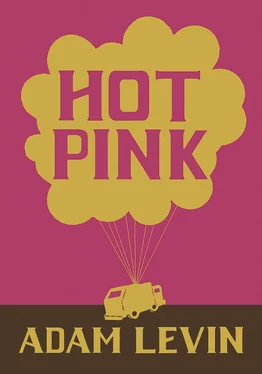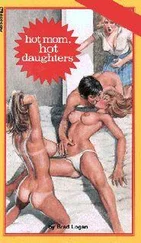“In your dreams,” one said. “This ain’t some movie. We don’t like you, and that haircut.”
“It’s a real stupid haircut,” another one said.
They trashed my beanbag, sifted the styrofoam filling for pills. Then they dumped my comics out of their dust bags, ripping the covers off both my mint-condition Lobo #1s — my first investments. At age twelve, I’d bought two so I could eventually sell one and still have my cake. The purchase occasioned a fight between me and my father. He didn’t like the idea that I saw comics as an investment in anything other than my “imagination.” From then on, I had to use my allowance to buy them, and my collecting behavior ended pretty quickly, and all for the better — my father’d been right. Lobo #1 was a huge bestseller. There were thousands of them in plastic dust bags with cardboard backings, in cardboard boxes in closets. The last I’d checked, they were worth less than half the price on their covers.
The cops found the Xanax and three “eighth” bags — luckily all I had at the time. The lawyer my father hired — old friend, deep discount — had me check into a six-week outpatient rehab program at a clinic in Highwood. They all knew I was faking, except the psychiatrist, Dr. Manx. I’d had Manx as a professor during the previous semester — Behaviorist Methodologies: An Introduction — and he liked me. He told me it was clear to him that I was angry, and that I suffered from chronic stress. In court eight weeks later, I pled guilty to misdemeanor possession, the lawyer argued I was a benzo and marijuana addict, and Manx said I used drugs in order to manage my anger and my stress.
I was a “self-medicator,” Manx told the judge, but I was twenty years old, my whole life ahead of me, and now I was clean.
I was fined $2,500 and given three years probation and a one-year prison sentence suspended on the condition I underwent weekly urinalyses and attended a twice-weekly anger-management group at the locale of my choice. I picked Highland Park Hospital. It was nearby and I could piss in their cup on my way out. Plus, the brochures said it was behavior-focused, and I liked B. F. Skinner. I’d been reading him steadily ever since the Manx class.
At the start of the first meeting, Jane Tell sat across the group circle from me. She kept her eyes on her knees, her hands in her lap, and her parted red hair fell thick past her shoulders. She scratched at her palms nonstop. Anyone else so slumped and ticky would have read timid, but Tell seemed spring-loaded, extra-alive. It was impossible not to watch her.
The therapist, in his homemade sweater, spoke the stilted-mushy English of a Martian diplomat. He told us the meetings were broken in two. The first hour was experiential, meaning topics weren’t scheduled and we would talk to one another about whatever was on our minds. The second hour was instructional. “Not that I am some kind of pedagogical heavy,” he said, “but if you will be patient with me, I think I can teach you one or two things.”
Aside from Tell and me, there were two women and three men, squint-eyed office workers in their mid-to-late thirties. They had imitation-leather day-planners and adenoidal difficulties. Their sense of humor was desperate, their jokes delivered in the voices they suppressed during staff meetings. They fell apart for the spoken italic. Indignant up-talking left them in stitches: the just… okay? punchline; the biting sarcasm of the yeah, right!? The last one of them to self-introduce to the group closed with the phrase, “And kicking the fucking copy machine when no one’s fuck ing looking, I’ll tell you what,” and they all laughed wildly at the enunciation of the second curse’s first syllable, the fluorescent overheads splotching oily patches on their over-pink faces, high shine in the spit-creeks of their off-white teeth.
Tell said she was nineteen and had dropped out of art school. She lived in Deerfield with her mother and stepfather. She called her mother “Peggy” and her stepdad “the Otter.” She fought with them viciously, and they had threatened to kick her out if she didn’t get treatment.
I told them I was a junior in college and I’d go to prison if I didn’t show up. A few of the office workers expressed discomfort. The therapist praised them for their openness and referred to me as a “mandated client.”
“Mandated clients,” he said, “tend to be resistant to the group process. Helping them to feel a part of the group is one of the activities that can make the group stronger and more helpful to all its members. We welcome you, Ben.”
During the break, Tell approached me at the refreshments table. She bugged her eyes out and nodded me toward her.
“I’m Ben,” I said.
She said, “I know your name. Don’t be such a Steve.”
“What’s a Steve?” I said.
“No,” Tell said. “Ask something braver.”
“You want to hang out?”
“Isn’t that what we’re doing?”
“Elsewhere,” I said. “In the future. On a ‘date.’”
“Don’t do it with air-quotes.”
“On a date ,” I said.
“I’ve never been on a date.”
“Few have,” I said. “Let alone with me.”
“Where would we go?”
“Denny’s,” I said. “Or the railroad tracks. Maybe even Denny’s and then the railroad tracks.”
“That’s some fancy date.”
“You…”
“What?”
“I’m a…”
“What?”
“I’m trying to come up with something to make you laugh, but we keep saying ‘date,’ and I’m a mandated client, and I’m spending all this energy resisting the reflex to shoot for a pun.”
“‘Let me take you on a really manly date,’ or something.”
“Exactly,” I said. “You deserve a lot better.”
“That’s nice,” Tell said. “It’s a nice thing to say. Probably you can just skip all the funny now and offer me a smoke.”
The designated area, on the parking-lot sidewalk, was a bus-stop shelter with columnar ashtrays. I sat on the bench and handed up a Marlboro — Tell remained standing. She bent toward my lighter, hair tucked behind her ears, cigarette lipped. She touched her fingers to my knuckles to guide the fire. Free from the dinge of those overhead fluorescents, I could see she was perfect, except for a round, red scrape on her cheek. Before I had a chance to say anything, she was standing up straight again, offering her hand. I took it, held on. She said, “It was nice to meet you, Ben.”
I said, “It was nice to meet you, too, Tell.”
She started off toward the parking-lot exit and then she returned to me. “We should try that again,” she said, “with eye contact.” She grasped my hand, said my name a second time, and looked at my eyes. Then she walked away, but not back inside.
Back inside, all the chairs were rearranged to face the wall. In front of the wall was a sketch-pad mounted on a tripod easel. In front of the pad stood the therapist. He said, “It’s time to begin the instructional portion of group. I think we’re still waiting for someone?”
They’d all seen us walk out together and now they were staring at me like I’d done something to her.
“Tell got sick,” I said. “She said she’d be back on Thursday and that she looked forward to it and hoped that none of you would feel insulted by her leaving early.”
“Actually,” one of the men toward the other end of the chair-line said, “I do feel a little insulted. In fact, very insulted.”
“That’s pretty fucken ridiculous,” I said.
The therapist clapped his hands once and said, “This is a perfect opportunity to learn some anger-management skills.” He removed a pink marker from its slot along the bottom of the easel and uncapped it. He wrote:
Читать дальше











